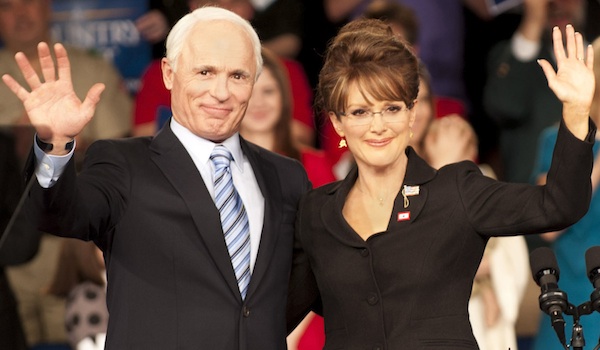Game Change Review
Those on the political Right will go to their graves arguing that Game Change is just a crock of liberal lies. Whatever. That’s irrelevant, as far as I’m concerned. True or false, this is an incredibly juicy and engaging piece of work, and it really does ring true, whatever the facts are.
Everyone knows the story of the 2008 presidential campaign by now. It was a long, laborious process born from the ashes of eight failed years of “leadership” from George W. Bush and Dick Cheney. What it ultimately gave us was a new, Democratic administration. A potentially unwanted byproduct (depending on where your views fall on the political spectrum) was the newfound power and influence granted to the now-former Alaskan governor, Sarah Palin.
Game Change begins with Senator John McCain (Ed Harris) accepting the Republican nomination for President. Behind the scenes, he and his team are nervous. The Democratic nominee, Barack Obama, is a genuine rock star, and his top advisor, Steven Schmidt (Woody Harrelson) believes the best way to combat this is to fight fire with fire. So they find a running mate who might not be qualified, per se, but has the potential to be a bigger star than even Obama—Palin (Julianne Moore).
Though she’s squarely conservative, has executive experience, and gives a killer stump speech, there are doubts—especially from the campaign’s communications director, Nicolle Wallace (Sarah Paulson)—about Palin’s foreign policy expertise. This fear proves true when Palin bombs a series of highly publicized interviews. And her confidence is suddenly killed, but can she get it back together in time to help McCain win? Or will she continue to spiral downward?
We, of course, already know the answer (a little of both, I guess), but the film plays out like a very believable piece of political fiction. Matt Damon famously quipped during the ’08 election that Palin’s story was like a bad Disney movie about a hockey mom thrust into the White House. Game Change and its director, Jay Roach, are kinder to Palin than that. She seems quite idealistic during the early stages of the campaign, and the better she does, the more confident she becomes. Her fatal flaw, however, is her inability to admit her mistakes and inadequacies. When it comes time to prepare for an interview, she fluffs it off. When the interview is a disaster, she blames those around her. And when she inevitably rebounds, it’s completely her own doing. Take credit for the positives, blame others for the negatives: That’s her M.O. And as frustrating as it is in real life, it helps make Game Change fascinating to watch.
Palin’s great arc is made all the better thanks to Julianne Moore’s brilliant performance. Had the film debuted in theaters, rather than HBO, she’d be a shoo-in for an Oscar nomination. We pity the woman as often as we fear her and the thought that she could end up in the White House. Woody Harrelson is relatively low-key, but his performance is as effective as Moore’s. Schmidt essentially makes a deal with the devil in this case—advising his candidate to make a political decision, rather than a moral one. But his rationale is fair: Tis better to lose going for the win than come up short and think you could have done more.
Game Change is accessible enough that politi-phobes shouldn’t be scared off. It’s about more than just an election. It’s a classic Greek tragedy about hubris and selling out ones own values. Like The Ides of March, the film isn’t exactly a revelation, but it’s well-made and features outstanding performances. If you don’t get HBO, be sure to catch it on DVD. It’s as close to a must-see as anything else we’ve seen this year.
















